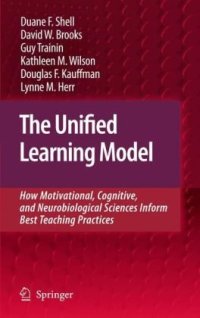
Ebook: The Unified Learning Model: How Motivational, Cognitive, and Neurobiological Sciences Inform Best Teaching Practices
- Genre: Education
- Tags: Learning & Instruction, Teaching and Teacher Education, Educational Psychology
- Year: 2010
- Publisher: Springer Netherlands
- Edition: 1
- Language: English
- pdf
This cutting-edge synthesis of ideas and concepts from the cognitive, motivation, and neurobiological sciences sets out a unique theory of learning that should be of interest to everyone from education practitioners to neuroscientists. The authors base their Unified Learning Model, or ULM, on three core principles. Firstly, that learning requires working memory allocation (attention). Second, that working memory’s capacity for allocation is affected by prior knowledge. And finally, that working memory allocation is directed by motivation. These three principles guide a complete model of learning that synthesizes what is known from research in brain function, cognition, and motivation.
This, then, is a book about how humans learn. Its focus is on classroom learning although the principles are, as the name of the book suggests, universal. The text’s scope covers learning from pre-school to post-graduate, as well as training in business, industrial and the military. It addresses all learning described by the word "thought", as well as anything we might try to teach, or instruct in formal educational settings.
The book presents a model of learning that the authors offer as scientists rather than educators. They assert that more than enough is known to sustain a "scientific" model of learning. Rather than being a mere review of the literature, this work is a synthesis. Many scholars and teachers will have heard much if not most or even all of the information used to develop the model. What they will not have come across is a model – designed to be both accessible and usable – that puts together the information in just this way.
This cutting-edge synthesis of ideas and concepts from the cognitive, motivation, and neurobiological sciences sets out a unique theory of learning that should be of interest to everyone from education practitioners to neuroscientists. The authors base their Unified Learning Model, or ULM, on three core principles. Firstly, that learning requires working memory allocation (attention). Second, that working memory’s capacity for allocation is affected by prior knowledge. And finally, that working memory allocation is directed by motivation. These three principles guide a complete model of learning that synthesizes what is known from research in brain function, cognition, and motivation. This, then, is a book about how humans learn. Its focus is on classroom learning although the principles are, as the name of the book suggests, universal. The text’s scope covers learning from pre-school to post-graduate, as well as training in business, industrial and the military. It addresses all learning described by the word "thought", as well as anything we might try to teach, or instruct in formal educational settings. The book presents a model of learning that the authors offer as scientists rather than educators. They assert that more than enough is known to sustain a "scientific" model of learning. Rather than being a mere review of the literature, this work is a synthesis. Many scholars and teachers will have heard much if not most or even all of the information used to develop the model. What they will not have come across is a model – designed to be both accessible and usable – that puts together the information in just this way.